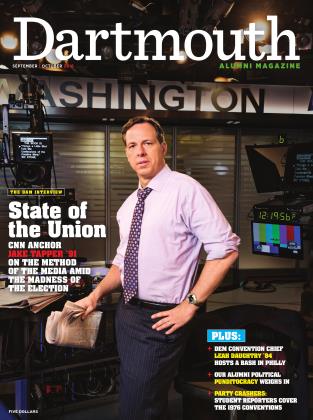EUREKA!
iBrains
The pros and cons of digital reading.
I NEW FINDINGS AND RESEARCH
Reading on digital devices such as laptops and smartphones may hinder the ability to think abstractly, according to a new paper by digital humanities professor Mary Flanagan and lead author Geoff Kaufman, who conducted the study as a postdoctoral researcher at Dartmouth’s Tiltfactor Laboratory. More than 300 participants were given a short story—some read a PDF on a laptop, others had a physical copy— and then completed a quiz to measure their comprehension. Print readers correctly answered more “big picture” questions than digital participants, who fared better with questions regarding concrete details of the story. “Knowing the affordances of digital technologies can help us design better software,” says Flanagan. “As we know more, we can design to overcome the tendencies—or deficits—inherent in digital devices.”
Survey Says...
Students all-in for diversity.
»> Intrigued by news coverage of recent college student protests, government professors John M. Carey and Yusaku Horiuchi decided to find out what undergrads really think about diversity issues—and whether campuses are as deeply divided as the media have claimed. With the help of research partners Madeline Brown ’16 and Lauren Martin ’16, the professors surveyed more than 1,100 Dartmouth undergrads using fully randomized conjoint analysis, a new technique designed by political scientists to prevent biased responses. The team found that students, across the board, want greater demographic diversity among faculty members and In undergraduate admissions. The analysis did not show polarization in the preferences of various student groups, though it did find that white males were the least concerned with the race and gender of faculty candidates. “We look forward to giving our survey on campuses whose students have different backgrounds than those at Dartmouth,” wrote Carey and Horiuchi in The Washington Post. “To think about what comes next for universities, it’s important to ask the right questions the right way.”
 View Full Issue
View Full Issue
More From This Issue
-
 Feature
FeatureThe Party Crashers
September | October 2016 By RICK BEYER ’78 -
 FEATURE
FEATUREPeacemaker
September | October 2016 By Matthew Mosk ’92 -
 THE DAM INTERVIEW
THE DAM INTERVIEWState of the Union
September | October 2016 By JULIA M. KLEIN -
 RETROSPECTIVE
RETROSPECTIVEValediction
September | October 2016 By SUE SHOCK -
 FACULTY OPINION
FACULTY OPINIONI Read, Therefore I Think
September | October 2016 By DEVIN SINGH -
 classnotes
classnotesDeaths
September | October 2016
Notebook
-
 notebook
notebookAT A GLANCE
NOVEMBER | DECEMBER 2017 -
 Notebook
NotebookUPFRONT Time Traveler
JANUARY | FEBRUARY 2025 -
 notebook
notebookFlex Time
JULY | AUGUST 2020 By ABIGAIL JONES ’03 -
 notebook
notebookFinishing School
MARCH | APRIL 2024 By ROBERT SULLIVAN '75 -
 notebook
notebookSigns Of Home
MARCH | APRIL 2018 By Sue Shock -
 notebook
notebookLOOK WHO’S TALKING
NOVEMBER | DECEMBER 2023 By Svati Kirsten Narula ’13

